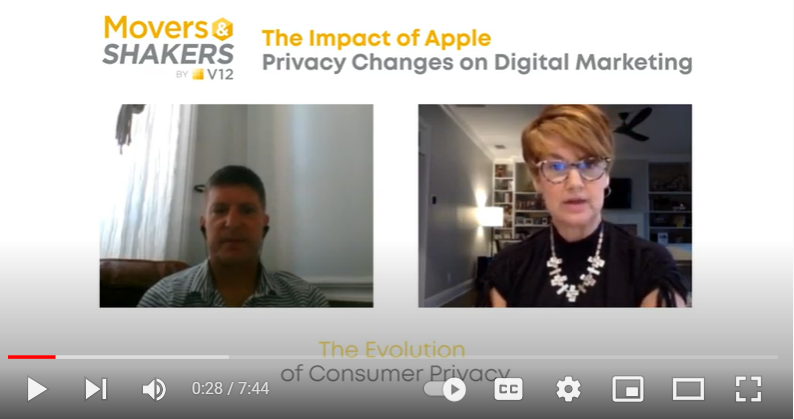Welcome to the Movers and Shakers podcast. Join us as industry leaders and experts discuss important marketing topics and share actionable insights and unique perspectives on the latest marketing, strategies, technology, and trends.
*This content has been adapted from our full-length Movers and Shakers video podcast, The Impact of Apple Privacy Changes on Digital Marketing.
Luci:
What are the nuts and bolts here of the Apple privacy changes? What do these changes really mean for consumers and marketers?

Todd:
So the first few of them are all around email. At Porch Group Media, we provide a lot of email services. For example, we can send acquisition emails for companies on their behalf. In order to make sure those emails are working correctly, they use tracking pixels. And that is exactly what these first three items refer to.
Are these just harmless tracking pixels, just to give feedback to the brand on whether these marketing messages were indeed relevant.
Or is this pixel being used for nefarious purposes where it’s actually collecting data from that device and sending to a third party? If that person opens that email, are they at risk for some sort of identity theft or other sorts of nefarious activities.
And so these first three are all about simply not allowing those tracking pixels to fire, which means brands don’t get feedback on the email they sent, whether it’s an acquisition email or a CRM email.
So all of those metrics that you use from a click and engagement perspective start to become in doubt. When we see dramatic changes in something as simple as open rates and click rates, and they’re no longer predictable, we really then see the negative headlines from an advertising perspective.
Sharing of mobile ID across apps allowed for a lot of identity tracking. It helped companies with some of those walled gardens even mix in impressions outside of their own app with other apps and those insights then come to life.
I know we all do this – we just download certain apps and agree to things but what permissions does that app really have? Geolocation services? Contact information? There was one photo app at one point that people didn’t realize was just collecting data and making stock inventory for ad campaigns. They were housing selfies to sell to creative agencies for whatever purposes, and people were consenting to give them those rights to their own image.
Those types of things are very real. And so I do think that the Apple tracking changes were good for consumers but it certainly caught a lot of those walled gardens by surprise. They rely so heavily on mobile and on these mobile ad IDs associated with a cell phone and it being persistent with the ability to port across apps on the phone was key to some of the benefits they provided to advertisers.
Luci:
For me, that was the most eye-opening about the apps. If I’m using an app or downloading a new app, I’m so thankful for that protection. As a consumer, I would never have even thought of it before. Other than maps, I’m not really sure who needs to track location really but it kept coming up so started to be a little scary to me.
Todd:
I agree – I think that is actually one of the better outcomes of these privacy changes.
Movers & Shakers Podcast by Porch Group Media
Subscribe below to stay tuned for upcoming episodes with other industry-leading marketing executives.
Stay up to date with the latest news and resources:
Learn how Porch Group Media can help you get to know your customers better and reach them across channels to boost your marketing success. Contact us to get started!





